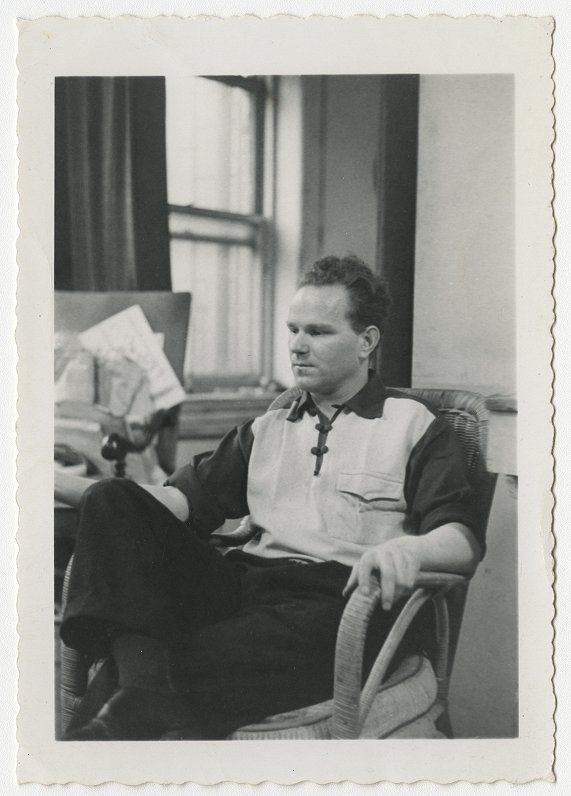At the end of November an exhibition dedicated to Linard Town will be inaugurated at the Museum of Writing and Music, but in the “Time of Poetry Days” program, Ilze Auzer, former financier, acquaintance of Linard Town, and Kristiana Kuzmina, art expert of the Museum of Scripture and Music, whose interests were mainly connected by his studies, speaks of the poet with the literature and personalities of exile, highlighting in particular the creative brotherhood “Elles keķis” and the poet Linards Town.
Christiana Kuzmin: What if Lynard was alive right now? Would he too be able to live in this moment, how he would feel, how would he see the world? Although he died so young, Towne was at the right time, in the right place and among the right people. I also think his fate has turned out as it should have been, no matter how tragic and painful it was for us, the fans of his poetry. Such was his life, and he was that “predestined poet”. What modern man can draw from Lynard’s poetry and personality is the great sincerity that is lacking in today’s world and the appreciation of the beauty of little things. The characters in his poetry are all that we still see today: the city, the children, the tea houses, the sun, the different colors. This is what makes up our daily life, we just have to look at it more ourselves. I think in a way it was like an invitation to the fact that in life you have to stop and look at the things that surround us – how much beauty there is around.
Piešiņa League: We remember the life path of Linards Towns – born in Latvia in 1922 …
Christiana Kuzmin: He spent his childhood in different places: in Ragaciem, Grīziņkaln, he fled to Germany with his brother, he arrived in New York in 1951, where the brightest, most colorful and emotional period of his life began. There he found his associates in the group “Elles keķis” -Gunaras Saliņa, Mudītis Austriņa, Rita Gāli and Fridrich Milta – brilliant personalities. Very big changes: from the simple Latvian countryside to a world metropolis where Western culture is developing, everything is happening very fast, where there are huge skyscrapers and the sun is visible only in certain points of the city. At the same time, he lived in a very nice place near the port of Manhattan, in the “Hell’s Kitchen” area, where all the impulses of the neighborhood impressed him vividly. Handwriting has also changed to a more Western and modern one. He writes only in Latvian, although he also knew foreign languages: English, Russian and Lithuanian. Towne was, in a sense, self-taught, as he had no higher education. He studied for himself what interested him: art, ancient cultures, Etruscans, oriental poetry, Chinese poetry. He also looked for like-minded people in Western poetry: he read Dylan Thomas, Guillaume Apollinaire. Thus was formed the sense of the world of him.
And from the Latvians it was Eriks Adamsons and Aleksands Čaks. In what period did Towne write the most?
Christiana Kuzmin: It was in the early 1950s, shortly after his arrival in New York, that he was literally torn apart. It seems he wrote more in 1953: he promised his friends that he would not drink alcohol for a year, drink only coke, sit in a bar and write down what came to his mind. The end of his life is even more tragic and sad as he finds himself increasingly at odds with himself. He understands that the ideals, which he mentions in his poem about him and wants to implement in life, cannot be realized in reality, they do not happen in life. Of course, Towne is also very disappointed in love because of his first wife, Gita Orlene. I think she has also sunk him emotionally.
Lynard Towne and Gita Orleans. New York in the 1950s
Photo: RTMM collection
–
–
Was Lynard Towne’s bread work also related to books?
Christiana Kuzmin: Yes, he worked for a while at Stahl’s typography as a typographer, but his main work was poetry, especially at the end of his life when he ruined his life with alcohol. Then his friends also helped financially, because the money he received for publications went to alcohol. Often the friends also had to help pay the bills and make sure he had food.
It is also fascinating that one of Town’s first purchases, whose receipt has been preserved and will be on display at the exhibition, was a typewriter.
Christiana Kuzmin: Yes, I admit it could be one of the biggest purchases of his life, because he didn’t have a lot of money. He simply chose to build his life differently than other cultural workers in exile.
Ilze, what are your memories of Linard Town?
Ilze Auzer: I was about 12 when Lynard died. I remember that day very vividly. My godmother Mudīte Austriņa was one of the muses of “Elles čekės”, she was very attached to both Linard and others. As a child I was taken to the “cage of hell”, at other times we also went to Linard’s. These are very strong memories from my childhood and she has given me a lot. I feel privileged to have been able to spend part of my childhood with poets, writers, artists. She was part of my life, she was my people. I felt like I was with people who were like ethereal beings and I was participating in the intermediate phase, somewhere between heaven and earth.
All my life I have enjoyed handsome, masculine men and I remember looking at Linard at the age of six and thinking: how attractive he is. I liked his hair, his features, he had that thing that is eternally sought after: a man is masculine, but at the same time also kind. And Linard was like that.

Lynard Towne. New York, United States. 1950s
Photo: RTMM collection
–
–
What is your current relationship with his poetry?
Ilze Auzer: I have a collection of all the poets from “The Hellcat”. I read something from time to time. What they wrote shows so vividly how much they experienced being in exile, having to flee. Other intelligent people liked New York and its culture very much, but they wanted Latvia so much. This pain lived in them, which is why they could write so beautifully. The New York characters were drastically different from the Latvian environment, where they retained their soul and intimacy, but New York still feels in all their poetry. Lynard loved Manhattan, no doubt. She was a very sensitive and good person.
Kristiana, you also have a picture of Linard Town on a shelf at home next to your favorite things. How did you find Linard and when did you realize he was your poet?
Christiana Kuzmin: It happened during my years of study, when I got both a bachelor’s and a master’s degree in Baltic philology. One of the little miracles in my life is that both the right books and the right authors come to me – they come up on their own. So it was with Lynard Towne. When I had to think about the topic of my dissertation, my beloved professor Viesturs Vecgravis suggested Towna. I didn’t know much about him, as far as I was told in my studies. I also had doubts about what was really waiting for me, if I would be able to face it or if I would “get over” it. But there was nothing to break, Town comes by itself. His poetry literally took over me as soon as I started working on my dissertation – I cried a lot, I felt a lot for him, so over time I started to consider him my soul mate. He is like a soul brother to me. I wrote both the degree thesis and the master’s degree thesis about him. Many thanks to Professor Vecgravis, who showed me the personalities close to Townas, new facets of poetry. It is a huge asset in my life. Of course, also the fact that I can work in the museum with his materials and his collection. When I first touched his manuscripts, it was the most emotional moment, it still moves me even though it’s been four years. Hold those fragile semi-assembled leaves in your hands: that’s where the fragility of time appears, the fragility of destiny. It is very symbolic in a way.
–


